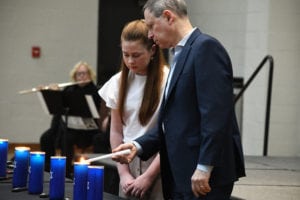
David Lee Preston, the guest speaker for this year’s Yom HaShoah program, lights one of nine memorial candles at the service. A journalist and son of survivors, Preston has written extensively about his parents’ experiences. (Community photos by William Beasley)
Down in the dark sewers of Lvov, Poland, Halina Wind Preston, and other Jews hiding from the Nazis, saw and did things that no person should ever have to do.
“A baby was born,” said her son, David Lee Preston, “and had to be suffocated lest its cries give away the group.”
Others, frustrated from hiding below ground, tried to escape to the outside. They were caught … and shot.
But there were also the diaries.
During her time in hiding, Halina Wind Preston filled four notebooks – 167 pages – with poetry and prose, all written in Polish.
Preston discovered his mother’s diaries three years ago while rummaging through a Xerox box filled with her possessions. There they were, in a smaller box, labeled with the Polish word for “sewers.”
An award-winning journalist and assistant city editor for the Philadelphia Media Network, Preston read an excerpt from these unpublished diaries for the first time to some 300 people at the April 11 Yom HaShoah Community Holocaust Commemoration at Bellarmine University.
The excerpt, a poem titled Not All is Gold that Shines, spoke of God, war, change and – his mother’s experience notwithstanding – hope.
Preston, who had spoken here five years earlier at another Yom HaShoah program, said he wanted to share the excerpt in Louisville because he feels a connection to the community.
He said the diaries are being prepared for publication. When published, they will join three cover stories he has written over the years for the Philadelphia Inquirer Sunday magazine about his parents’ experiences in the Holocaust.
“Even as a boy, I knew my mother expected me to chronicle her story,” Preston told the crowd, “but I didn’t know I would have to do it without her.”
Halina Wind Preston died in 1982. Five months after her death, for Mother’s Day, Preston wrote the first of his cover stories about her.
She came from a small town in the Carpathian Mountains. Her parents sent her to Lvov in 1942 to escape the Nazis. She never saw them again.
In Lvov, two sewer workers named Leopold Socha and Stefan Wroblewski hid her and small group of other Jews beneath the city for 14 months, bringing them food, clothing even a prayer book Socha found in the ruins of the Lvov ghetto.
Years later, in 1977, Halina Wind Preston testified at Yad Vashem on behalf of the sewer workers, leading to their designation as Righteous Among the Nations.
Preston’s first story about his mother, A Bird in the Wind, inspired a movie, In Darkness, and an as-yet uncompleted book. He also wrote a piece for CNN.com about his mother’s experience.
Preston used his speech to read from the cover story he wrote about his father George Preston, also a Holocaust survivor — Journey to My Father’s Holocaust. After his mother died, Preston and his father returned to Poland, where they visited all the sites his father had been during his ordeal. The trip led to the story,.
He also wrote a second piece about his mother, her home and family in Poland, and how he became their voice — A story for my mother.
Nine memorial candles were lit at the Yom HaShoah program. Survivors, children of survivors, a widow of a G.I. concentration camp liberator and, appropriately enough, school teachers who have made the Holocaust part of their classroom instruction, kindled the flames.
Preston was among the candle lighters.
The April 11 program came three weeks after the state legislature passed the Ann Klein and Fred Gross Holocaust Education Act, which mandates instruction of the Holocaust and other acts of genocide in Kentucky’s public schools.
Gov. Matt Bevin has since signed the bill.
Fred Whittaker of St. Francis of Assisi Catholic School in Louisville, who spent 13 years lobbying for the act, read a tribute to four survivors from Louisville who died during the past year: Claus Behr, Melvin Goldfarb and John and Renee Rothschild.
This year’s Yom HaShoah commemoration comes as a wave of nationalism sweeps Eastern Europe, threatening to revise history and excuse accomplices to the Nazis in the Holocaust.
Earlier this year, Poland passed a law criminalizing blaming Poles or the country for complicity in Nazi crimes. (The country’s attorney general has since described the law as partly unconstitutional.)
And earlier this month, Hungary reelected its far-right president, Viktor Orban, in a landslide.
Preston addressed this trend in his remarks, warning that such revisionism “distorts” history making it harder to find and teach the truth to future generations.
“We whitewash the past at our own peril,” he said.


